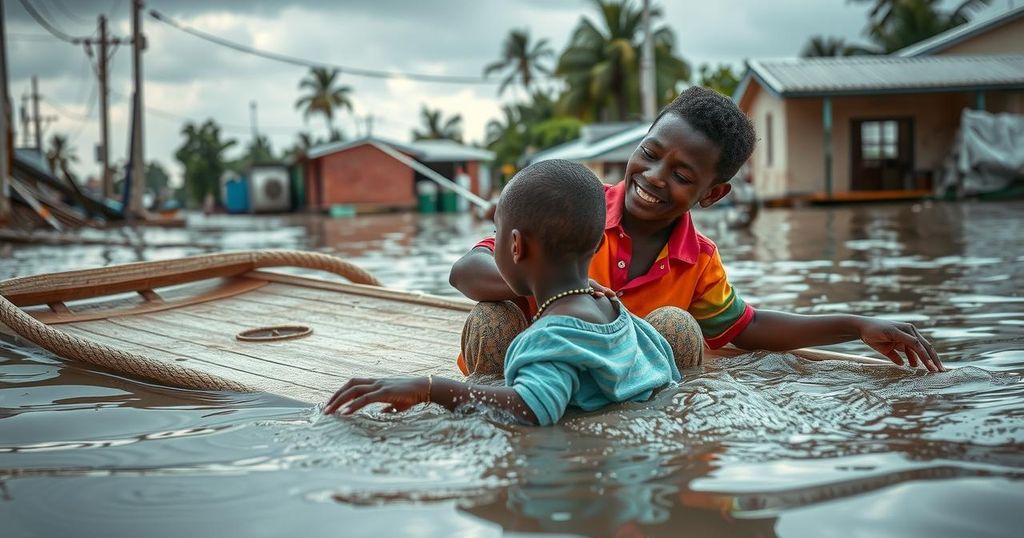Tropical Cyclone Chido has devastated northern Mozambique, affecting around 90,000 children and damaging over 35,000 homes in Cabo Delgado. The cyclone exacerbates existing vulnerabilities in a region suffering from conflict and health crises. Despite the challenges, UN agencies are responding to urgent humanitarian needs while assessing the broader impact of the disaster in surrounding provinces.
Tropical Cyclone Chido has significantly impacted northern Mozambique, particularly the Cabo Delgado province, resulting in widespread devastation. The storm inflicted damage to over 35,000 homes, displacing countless families and affecting approximately 90,000 children, as reported by the United Nations Children’s Fund (UNICEF). Current assessments indicate that the cyclone has impacted about 174,000 individuals overall, with damage extending to 186,000 classrooms and numerous healthcare facilities, exacerbating existing vulnerabilities in the region.
The cyclone’s destruction commenced on Sunday when it made landfall near Pemba, leading to the loss of roofs, infrastructure, and the interruption of electricity and communication services. Mary Louise Eagleton, UNICEF Representative in Mozambique, stated that the country faces multiple challenges due to climate change, conflicts, and previous emergencies affecting children. UNICEF, along with various partner organizations, is mobilizing resources to support emergency humanitarian efforts despite the daunting circumstances.
Cabo Delgado province has been grappling with a prolonged conflict lasting seven years, displacing over 1.3 million individuals, primarily women and children. Cyclone Chido has further compounded the strife by erasing the progress made in rebuilding lives and communities. Additionally, the cyclonic activity has spread damage to the Nampula and Niassa provinces with more than 25,000 families losing their access to electricity and significant damage to water facilities. In light of a preexisting cholera outbreak, these developments threaten to worsen public health conditions.
The UN refugee agency, UNHCR, rapidly responded by providing emergency aid to over 2,600 individuals in Pemba within 48 hours following the cyclone. The agency highlighted in Geneva that preliminary assessments suggest 190,000 people are in urgent need of humanitarian aid, with significant destruction reported in schools and residential structures. The extent of the damage remains difficult to quantify, particularly in rural areas where homes have been decimated.
UN Secretary-General António Guterres affirmed that UN teams are actively engaged in delivering emergency assistance, assuring continued readiness to provide further support. Meanwhile, the UN Office for the Coordination of Humanitarian Affairs (OCHA) indicated that supply shortages hinder response efforts and highlighted that Emergency Relief Coordinator Tom Fletcher allocated $4 million to address immediate humanitarian needs. Nearly 3.3 million people in Mozambique are expected to face heightened levels of food insecurity in the upcoming year, prompting the World Food Programme (WFP) to enhance its assistance programs.
Cyclone Chido’s impact also reached Mayotte, a French overseas territory, where notable infrastructure damage and increased risks for vulnerable communities were observed. In Malawi, the cyclone caused substantial damage through winds and rains, affecting housing and infrastructure in several regions. UN agencies remain vigilant, coordinating with local stakeholders to monitor the evolving situation and provide necessary support.
Tropical Cyclone Chido, occurring during a period of heightened vulnerability, has demonstrated the severe implications of climate change in Mozambique. Previously affected by prolonged conflict and health crises, the northern region has been further destabilized by natural disasters. The historical context of Cabo Delgado’s conflict and climate challenges provides critical insight into the current humanitarian emergency faced by children and families in the aftermath of Cyclone Chido. The ongoing response from international organizations is crucial to address the immediate needs and facilitate recovery efforts in the affected regions.
In light of the destruction caused by Cyclone Chido, it is evident that the humanitarian needs in Mozambique are dire. Approximately 90,000 children are among the most affected, necessitating immediate international assistance. As damage assessments continue, support from UN agencies, NGOs, and the government remains paramount to address the complex challenges faced by the communities in affected provinces. The urgent call to action seeks to mitigate the repercussions of this disaster amidst ongoing crises in the region.
Original Source: news.un.org






